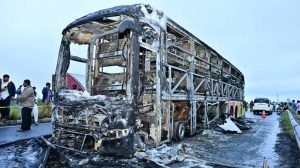NCP loses national party status but its bastion Maharashtra remains safe, Sharad Pawar’s stature unquestionable
Although the Congress and the BJP are the two mainstream political parties with pan-India acceptance, the NCP's electoral base in Maharashtra has remained loyal when it comes to Assembly polls.
 Sharad Pawar addressing a rally amid heavy rain in Satara became the defining image of the 2019 Assembly polls. (Source: Twitter)
Sharad Pawar addressing a rally amid heavy rain in Satara became the defining image of the 2019 Assembly polls. (Source: Twitter) Nationalist Congress Party (NCP) may have lost the national party status but that development is unlikely to make a difference electorally in its forte Maharashtra, where NCP president Sharad Pawar is acceptable to one and all.
The NCP was formed in 1999. In 2000, it earned national party status conforming to the Election Commission of India (ECI) rules. The ECI revoked the NCP’s national party status on the basis of its election performances in 2014 and 2019 and the party will now have state party status only in Maharashtra and Nagaland.
NCP MP Supriya Sule said, “We accept the Election Commission decision. We will study the EC order and then respond in detail.”
In Maharashtra, the NCP’s ability to make or break political alliances and government has remained constant. Under the leadership of Sharad Pawar, 82, the NCP has embarked on unprecedented political experiments.
A senior NCP leader, requesting anonymity, said, “Losing national status is not a good feeling. But that gives us reasons to work harder to regain our lost ground in the 2024 Lok Sabha and Assembly elections. ”
The NCP state leaders have set an ambitious target of 100 out of the 288 seats in the 2024 Assembly elections. The party is determined to bring the like-minded Congress and Shiv Sena (UBT) to work together under the Maha Vikas Aghadi (MVA) banner.
Irrespective of its numbers elections since 1999, Pawar’s influence at both the Centre and the state has remained undimmed. As a result, neither the ruling BJP-Shiv Sena (Shinde faction) nor the opposition parties the Congress and Shiv Sena are writing off the NCP.
Although the Congress and the BJP are the two mainstream political parties with pan-India acceptance, the NCP’s electoral base in Maharashtra has remained loyal when it comes to Assembly polls.
In 1999, the year of its birth, the NCP faced the first Assembly polls and won 58 seats with a 22.60 per cent vote share. The Congress emerged as the largest party with 75 seats and a 27.20 per cent vote share. Shiv Sena won 69 seats (17.33 per cent vote share) and the BJP 56 seats ( 14.54 per cent vote share).
Five years later, the NCP stumped Congress as the leading party, bagging 71 seats with a vote share of 18.75 per cent. Despite being the leading party, Pawar handed the chief minister post to the Congress. In the bargain, Pawar got important portfolios for his candidates, including home, finance, energy, rural development, and water resources. The Congress-NCP coalition government in Maharashtra lasted from 1999 to 2014.
The 2014 Assembly election was a setback to the Congress and the NCP. Under the leadership of Prime Minister Narendra Modi at the Centre and Devendra Fadnavis in Maharashtra, the BJP emerged as the largest party, winning 122 seats out of 288. The 2014 poll was multi-cornered as all four parties — the Congress, the NCP, the BJP and Shiv Sena — contested separately.
Despite its ideological differences, the NCP pledged support to BJP in Maharashtra. The reason cited was a stable government. The political managers in the NCP said, “The NCP support to the BJP was not for power. It was a tactic to avoid a split within NCP on the one hand. Secondly, the larger objective was to keep Shiv Sena away from the BJP.”
Although the BJP and Shiv Sena were united and formed a coalition government, the seeds of discord were sown. Five years later, in 2019, it manifested with Uddhav Thackeray breaking ties with the BJP, and joining the Congress and the NCP to form the MVA government.
Whether the 1999 Congress-NCP coalition or the 2019 Congress-NCP-Shiv Sena coalition, the Pawar factor was integral in evolving the new political permutation and combination in state politics.
With the emergence of the BJP, the NCP’s strength had somewhat reduced. But it has retained its vote share. In 1999, the NCP’s seat tally and vote share were 58 and 22.60 per cent. The corresponding numbers for subsequent polls were: 2004 — 71 (18.75 per cent); 2009 — 62 (16.37 per cent); 2014 — 41 (17.24 per cent); 2019 — 54 (16.71 per cent).
Even during the rule of the United Progressive Alliance (UPA) government at the Centre, when Pawar was the Union minister for agriculture for two consecutive terms (ten years), the NCP’s strength in Lok Sabha never crossed double digits.
Beyond the electoral arithmetic, what worked in favour of the NCP was the chemistry its leadership shared across parties, leaders and regions. Even at a time when Pawar becomes a rallying force to get opposition together, he has displayed the same ease sitting for discussion with Union Home Minister and Cooperation Minister Amit Shah. Despite political differences, Pawar’s cordial relationship with PM Modi makes him stand out.
At a time when Congress leader Rahul Gandhi has been attacking the BJP and PM Modi, the NCP took an independent stand. Maharashtra Opposition leader Ajit Pawar of the NCP said, ” What is the point of raising the PM’s degree? He has been the PM for nine years.”







